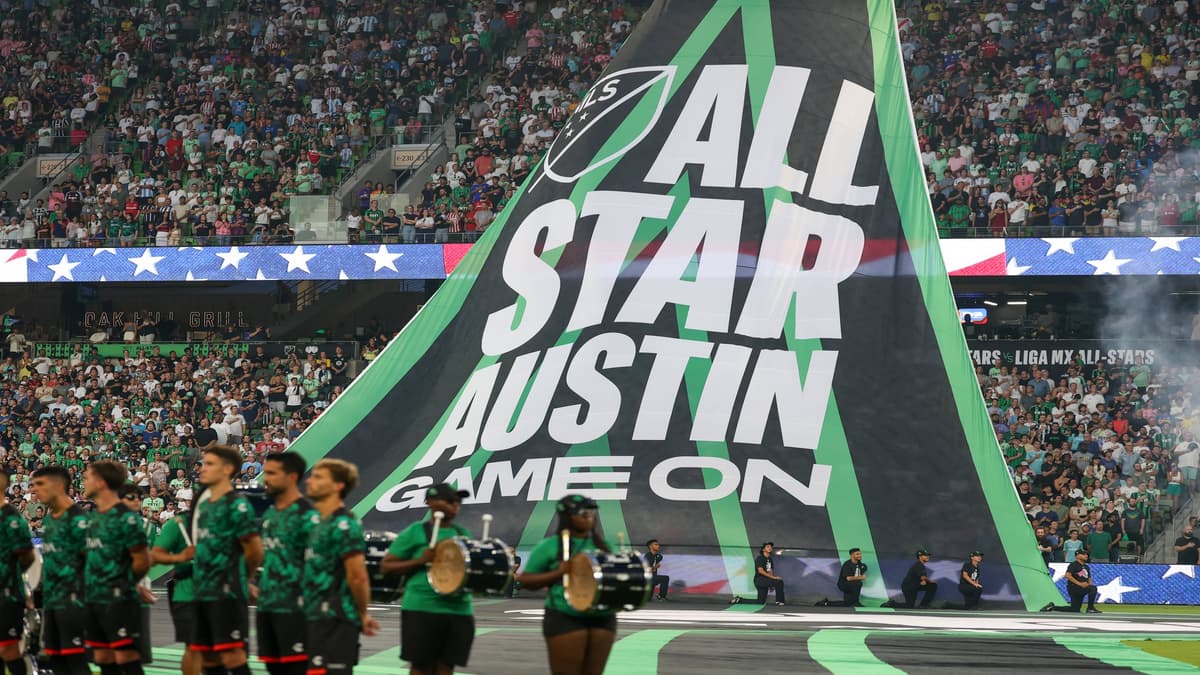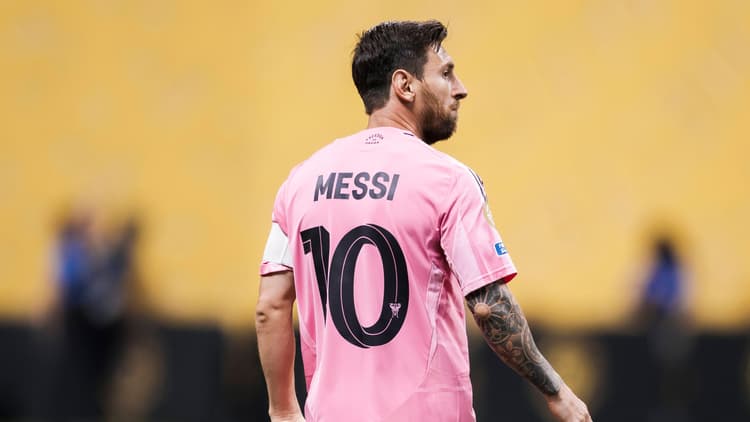-
News
- 11 hours ago
The MLS All-Star game is going nowhere - but change is very possible

From a baseball game played at the 1933 World's Fair in Chicago to the modern iterations celebrated by all the United States' major sports leagues, All-Star Games always have been something of a spectacle.
Despite sports' quest to make each competition mean something, the All-Star game rewrites that script and states proudly that it is an exhibition, a game to enjoy once and think about no more. Being named an "All-Star" is a prize to be savoured - it provides extra recognition, a bonus and the trip to the game with your family in tow - the deserved spoils of a good first half of the year.
So, it is no surprise that Major League Soccer's version once again sits at the nexus of the culture clash the league so often finds itself navigating: soccer purists have one view, while fans of traditional American leagues have another.
Over the years, MLS has tried different formats that would please both elements of its current fanbase and also bring in new fans. After the traditional (to US sports) East v West, MLS trialled "USA v the World" games before settling into inviting a European team on a pre-season US tour to serve as the opponent. But rivalry called, and the 2025 game in Austin was the fourth edition of MLS' All-Stars against their Liga MX counterparts.
It is a natural opponent for MLS, though not necessarily one that is guaranteed to continue being the opposition. The two leagues have a genuine rivalry thanks to Mexican clubs' dominance of the CONCACAF Champions Cup - much to MLS' chagrin - and the legions of Liga MX fans who live in the US, most of whom live and die with their team in Mexico and are apathetic toward the MLS team in their local market.
Changing those fans' notions about MLS and convincing them to adopt a team - or at least to keep buying tickets for events like the All-Star Game - sits at the heart of the strategy of keeping the current format in place.
Both teams make an effort to bring their best. This year, however, that proved more of a challenge than in the past.
Lionel Messi missed out on last year's contest with a knock, but had no injury excuse he could use to opt out this year.
Well, no excuse other than having playec in the Club World Cup, and a series of MLS matches before and after that tournament, and the CONCACAF Champions Cup plus getting set for the Leagues Cup - a tournament that pits MLS v Liga MX on the club level.

That led to a days-long discussion about whether or not Messi would arrive in Austin and grace the field for a cameo of 15 minutes or so. That isn't just the Messi discount on time: with a desire to return everyone to their clubs in optimal condition, most players end up seeing less than 30 minutes of game time.
In the end, Messi never showed, a decision that earned him a suspension for Inter Miami's next league game. It also denied fans the chance to see him take on his old El Clasico rival Sergio Ramos, who captained the Liga MX side.
Ramos' former Real Madrid team-mate James Rodriguez also ducked out of the game, but with fellow Spaniard and club team-mate Sergio Canales, Mexico No.1 Luis Malagon, Tigres ace Juan Brunetta and 16-year-old hot shot Gilberto Mora, Liga MX had plenty of high-profile quality in their ranks.
The players who do turn up - and understand the quirks of an All-Star event - can make the most of a low-intensity trip to a fine MLS city.
Driving home the message about the event being all for fun and entertainment, the night before the match sees the All-Star Skills challenge, with players taking on apparatuses built to test their precision passing, their shooting accuracy and other elements of the game. It ends with a crossbar challenge, which was improbably won this year by Vancouver Whitecaps goalkeeper Yohei Takaoka. In line with the viral tweets asking for a mortal to compete in each Olympic event, MLS invited streamer iShowSpeed to Austin.
The 20-year-old - given name Darren Watkins - participated in a pair of events, providing an example of what a non-pro could do. The younger All-Stars on both the MLS and Liga MX teams seemed to enjoy interacting with the streaming star.
The match itself was buoyed by Austin supporters, who had turned out in their thousands even to see some of the ancillary events earlier during the week, including an All-Star Game designed to showcase the future stars in MLS academies. Unlike past All-Star hosts, the Austin supporters' group was prepared with their usual repertoire of songs and chants, serenading hometown hero Brad Stuver, the starting MLS goalkeeper, and other Austin stars.
While Mora scored, continuing to increase the hype and the asking price ahead of his 18th birthday when he is expected to move from Club Tijuana to Europe, it was otherwise a great night for MLS. Forwards Sam Surridge, Tai Baribo and Brian White each found the back of the net to lift MLS to a 3-1 win - revenge for the 4-1 defeat they suffered to the same opponent last year.
Whether or not there will be another opportunity for revenge remains up in the air. While MLS and Liga MX are working closely together for the time being, the spectre of Liga MX playing regular season matches in the US looms as a serious threat to MLS' continued growth. Those same fans that MLS are trying to woo by increasing contact with Liga MX teams, not just in the All-Star Game but also in the Leagues Cup, may see no use in supporting another league if their favourite clubs are playing competitive games in their own backyards.
A new leader should take over Liga MX soon, with current president Mikel Arriola serving as both the president of the Mexican federation and the top role in the league. Whether or not that person sees MLS as a partner, like Arriola does, will determine much of the atmosphere about the two leagues working together.
Arriola and the Liga MX owners he tries to get consensus from have generally looked to MLS more than vice versa. While Mexico's clubs have been better on the field, and the history and mystique around them certainly lend a romantic counterbalance to the often corporate feel of MLS, executives south of the border admit that MLS has it beat at the box office and in the marketing game.
That's why Liga MX has made some modifications to its league including freezing promotion and relegation, a move cribbed directly from MLS' franchise system. Decisions like those have attracted new faces to the table at the owners' meetings, with American businessman Marc Spiegel buying Queretaro this summer. They became the second US group to buy in after the star-studded NX football group, which includes Eva Longoria and Wrexham duo Rob McElhenney and Ryan Reynolds among other celebrities, purchased a stake in Necaxa.
Next year's All-Star Game, the 30th edition, will take place in Charlotte, North Carolina, and it will be highly anticipated. MLS commissioner Don Garber said Austin raised the bar when it comes to what is expected as an All-Star host. For now, which teams will be involved is still to be decided.
Last 10 MLS All-Star Matches
| Year | Result |
|---|---|
| 2025 | MLS All-Stars 3-1 Liga MX All-Stars |
| 2024 | MLS All-Stars 1-4 Liga MX All-Stars |
| 2023 | MLS AIl-Stars 0-5 Arsenal |
| 2022 | MLS All-Stars 2-1 Liga MX All-Stars |
| 2021 | MLS All-Stars (p) 1-1 Liga MX All-Stars |
| 2019 | MLS All-Stars 0-3 Atletico Madrid |
| 2018 | MLS All-Stars 1-1 (p) Juventus |
| 2017 | MLS All-Stars 1-1 (p) Real Madrid |
| 2016 | MLS AIl-Stars 1-2 Arsenal |
| 2015 | MLS All-Stars 2-1 Tottenham Hotspur |
In addition to the match and skills competition, All-Star also serves as a league convention of sorts, with the owners, sporting directors and other officials from all clubs gathering in the same place. The league's Board of Governors meets to speak about potential modifications, and this year's edition was anticipated because of a number of potentially seismic changes being rumoured.
Instead, while Garber announced the framework of an "MLS 3.0" at his annual news conference ahead of the All-Star Game, little actually got over the line when it comes to changes that would revolutionise the league ahead of the 2026 World Cup. Instead, fans will be waiting another six months to hear about potential loosening of roster regulations to allow for teams to sign more stars like the ones on the field of Q2 Stadium.
They'll also, again, see a decision on whether MLS will move to a calendar that more closely resembles the European one or if they will continue to use the current dates that run from the late winter to the late fall.
Once again, it seems, MLS is stuck between what makes the most sense to those who are familiar with other soccer leagues around the world and what makes sense to American sports traditionalists.
The All-Star Game is going nowhere, but change is very possible when it comes to who the opponent is, who is required to play in it and how the league it is celebrating chooses to present itself to fans in the US and beyond. MLS must find a way to continue being a spectacle, taking a cue from its own All-Star Game and simply having fun with it, but also to be taken seriously in world soccer - and to keep the owners happy and the interest of enough fans hoping to spend their money to enjoy the product.
Words by Jon Arnold.


















